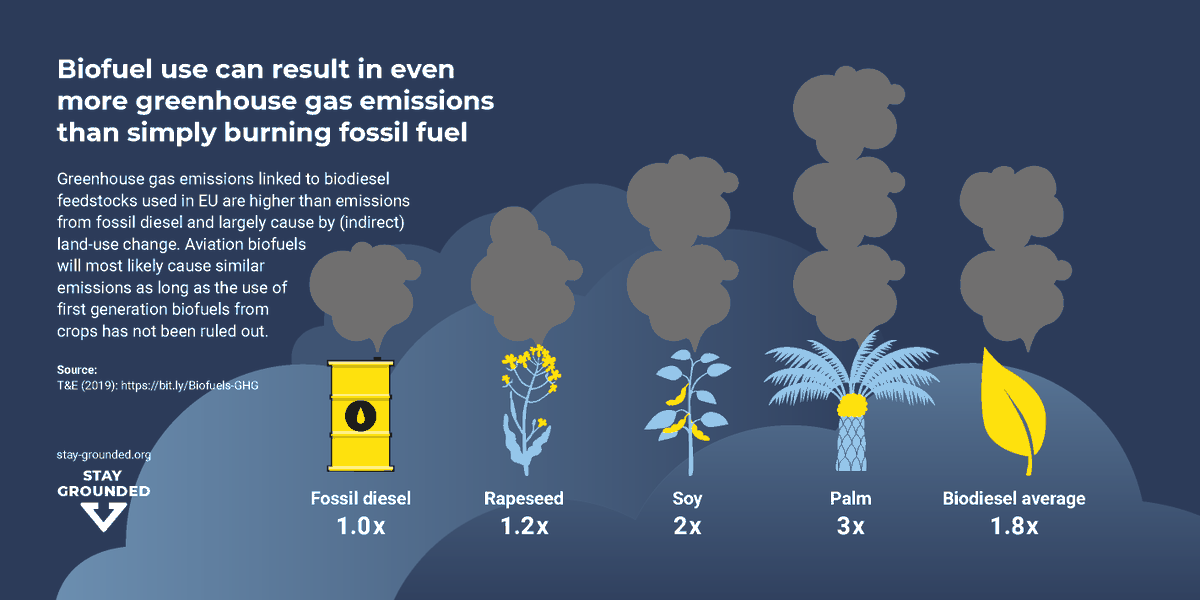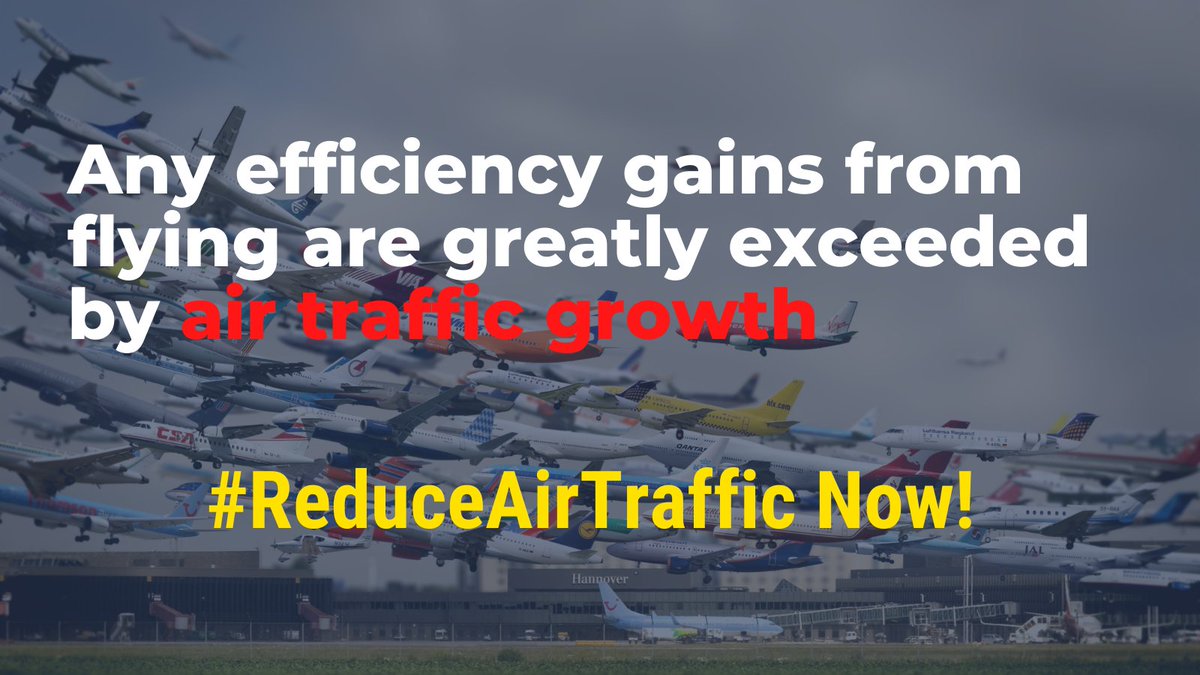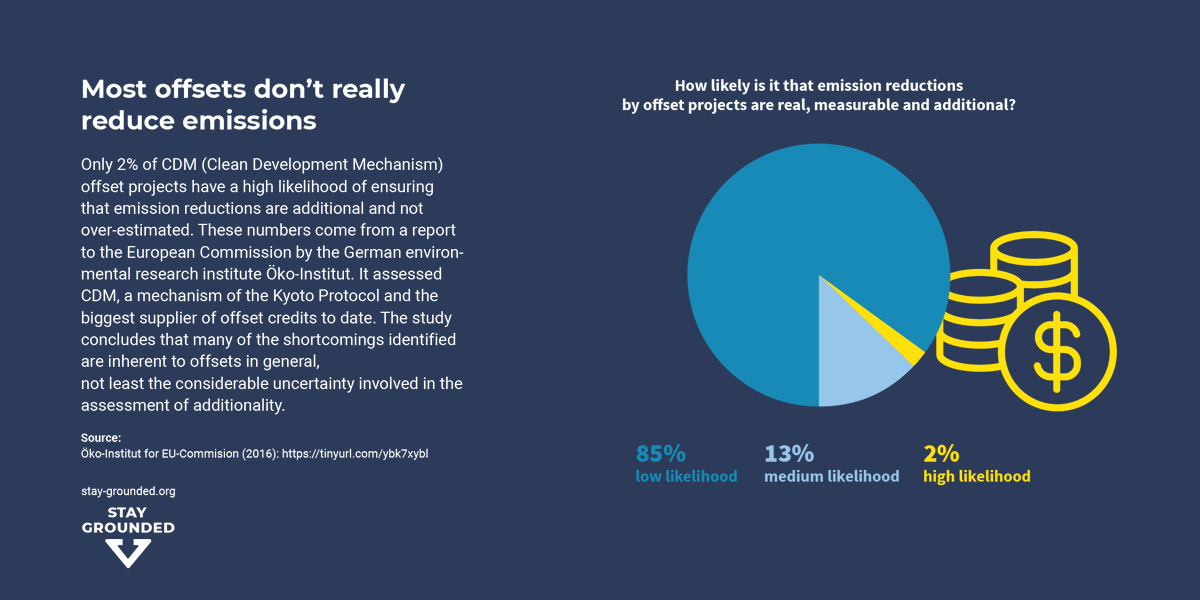
#Biofuels & #aviation: out of the frying pan into the fire
Biofuels are *theoretically* a feasible alternative to fossil jet fuel. But: they have countless negative side effects and their quantity will remain limited. #greenwashing
A thread on their problems and limits. 🔽🧵
Biofuels are *theoretically* a feasible alternative to fossil jet fuel. But: they have countless negative side effects and their quantity will remain limited. #greenwashing
A thread on their problems and limits. 🔽🧵

Problem 1: biofuel use is severely constrained by the sustainability and availability of biomass
It is often claimed that aviation would use only second generation biofuels derived from 'waste' sources, therefore avoiding any direct or indirect sustainability impacts. Yet the use of first generation biofuels from crops and even entire trees has not been ruled out.
There are plans for huge 'sustainable aviation fuel' refineries in Paraguay using soybeans as a feedstock and such fuels are permitted under the Carbon Offsetting and Reduction Scheme for International Aviation, which is the only internationally agreed policy and runs until 2035.
The threat of scaling up the use of commodities like soy or palm oil with high risk of deforestation is increasing as greater political emphasis is placed on the supposed benefits of 'sustainable aviation fuel' (SAF).
The cultivation of energy crops in large monoculture fields increases the use of fertilisers, pesticides and herbicides; with devastating environmental, biodiversity and health impacts.
The expansion of agriculture like soy and palm - in this case for 'sustainable aviation fuels' - leads to CO2 emissions from land use change which can be similar to, or greater, than fossil fuel emissions. 

It can also result in humanitarian impacts like land conflicts, labour abuses, rising food prices, water scarcity and chronic disease in neighbouring communities from pollution.
The only process currently able to produce second generation biofuels for aviation at a commercial scale uses 'waste oils', due to its similarity to biodiesel, which is already produced at a limited commercial scale for the road sector.
It has been found that when 'waste oils' are used to produce large quantities of biodiesel, it displaces their use in other sectors; which then transition to other sources, such as palm oil.
This also creates the opportunity for fraud, eg.: where fresh palm oil has been sold as 'used cooking oil'. Also palm oil or derivatives are often being used but being disguised by another term. This indirectly causes an increase in crops for energy with their associated impacts.
Problem 2: biofuels would compete with other applications
The future quantity of any sustainable biomass 'waste'
available globally is strictly limited and without fuel production processes having been demonstrated at any significant commercial level.
available globally is strictly limited and without fuel production processes having been demonstrated at any significant commercial level.
An EU report in 2020 stated that 'biofuels' reliance on feedstock, changes in land use, high water use, and/or monoculture (i.e., the production of a single crop) means that the aviation industry will be competing with other interests that need the feedstock for other purposes.
Governments will need to use any biomass produced to feed a growing global population whilst also decarbonising the power, heating, agriculture (e.g. replacing fossil fuel fertilisers) and transport sectors.
Problem 3: biofuels would only partially reduce aviation climate impact vs. fossil fuels
The industry claims that "SAF can reduce emissions by up to 80% during its full life cycle". However, GHG savings of only 60% have been proposed at national levels as a threshold for 'SAF' and fuels eligible under the international CORSIA scheme can have savings as low as 10%.
Aviation also produces non-CO2 emissions such as contrails which are estimated to cause a greater global heating effect than aviation CO2 today. Recent studies have shown that with biofuels these non-CO2 emissions can only be partially reduced.
Problem 4: governments should not subsidise aviation biofuels
Even if scaled up further, aviation biofuels will still cost far more than kerosene. These increased costs would undermine the expansion plans of the industry.
The only way the aviation industry can continue to grow whilst using larger quantities of alternative jet fuels such as biofuel, would be to obtain large government subsidies for their production.
But investing in bio-refineries would pose a huge risk to public finances as it is unlikely that aviation biofuels can ever be viewed as "sustainable". In the end taxpayers, most of whom never or rarely fly, should not be paying for that.
Problem 5: biofuels cannot be scaled up rapidly enough and neither should this be the goal
Biofuel scale up has been promised by the aviation industry for more than a decade but this has not materialised. Targets have been routinely missed by significant margins and then ambition ratcheted down across successive years.
In 2009, the International Air Transport Organisation (IATA) was aiming for 10% biofuels by 2017 and in 2011, Air Transport Action Group (ATAG) stated: "We are striving to practically replace 6% of our fuel in 2020 with biofuel. We hope this figure can be higher".
Even if we were to accept the industry’s most optimistic projections of biofuel use, they still don't expect that such fuels will provide a large percentage of total fuel consumption over the next few decades, given their plans for huge growth in air traffic and fuel consumption.
For example, the EU has presented plans that will only put them on track to deliver 5% alternative jet fuel (mostly biofuel) by 2030.
With limited quantities of biomass available and thus limited biofuel potential, the only way to deliver a greater overall percentage within meaningful timescales would be to decrease total fuel consumption.
But: even those limited quantities would compete with other applications and bring danger of human rights violations, emissions through land-use change and biodiversity loss.
Bottom line: #biofuels a false solution on many different levels and a clear threat to meeting climate targets in a just manner. #ClimateJustice #greenwashing #ReduceAirTraffic 

You can find our #biofuels and #aviation factsheet and all our #greenwashing factsheets on our website: stay-grounded.org/greenwashing/ 

It's not just the false promise of flying on #biofuels: stop #Greenwashing - #ReduceAirTraffic now!
The aviation industry continues to shirk its responsibility for #ClimateAction using false promises.
▶️ Support the petition: stay-grounded.org/stop-greenwash…
The aviation industry continues to shirk its responsibility for #ClimateAction using false promises.
▶️ Support the petition: stay-grounded.org/stop-greenwash…

➕ If you want to learn more about #biofuels and their problems, follow our member @biofuelwatch!
• • •
Missing some Tweet in this thread? You can try to
force a refresh











